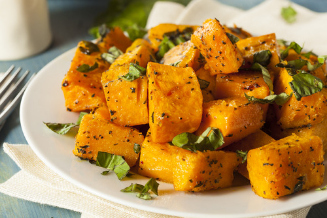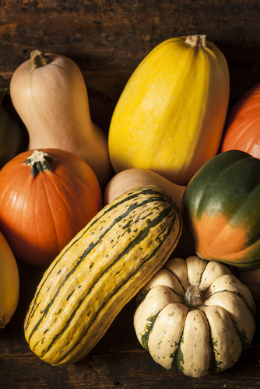Butternut Squash, Chickpea and Spinach Curry
Posted on
Butternut Squash, Chickpea and Spinach Curry
Serves: 4
 Choose organic where possible
Choose organic where possible
Ingredients
- 1 Butternut squash 6-8 inches high, peeled and diced with seeds scooped out
- 200g Spinach
- 400g chickpeas (1 can)
- 1 tin of tomatoes
- 1 tin coconut milk
- 2 cloves of garlic, finely chopped
- 1 onion, finely chopped
- 1 green chilli, finely chopped (more if you like it very spicy)
- 1inch of ginger root, peeled and finely chopped
- A handful of chopped fresh coriander
- Half a lemon
Spices
- 1 tbsp cumin seed
- 1 tbsp coriander seed
- ½ tbsp turmeric
- 8 black peppercorns
Method
- If serving with brown rice, then add 50g rice per person to a pan of water, bring to the boil and simmer for 25-30 minutes until the rice is tender.
- Grind the spices in a pestle and mortar
- Lightly fry the onion until translucent over a medium heat in small amount of coconut oil
- Add the garlic, ginger and chilli, stirring and cooking for 2 minutes
- Add the spices stir well and cook for a further 2 minutes
- Add the butternut squash and coat in the ingredients in the pan, cook for a further 2-3 minutes
- Add the tomatoes and coconut milk, cook for 10-15 minutes until the squash is cooked and you can push a fork through it
- Drain and rinse the chickpeas, add to the pan along with the spinach
- Cook for a couple of minutes and serve, sprinkle over the fresh coriander and a squeeze of lemon.

 Food is the basis of our health; it provides the fuel to run our bodies. Put simply: “poor foods = poor fuel” which leads to reduced energy and imbalances.
Food is the basis of our health; it provides the fuel to run our bodies. Put simply: “poor foods = poor fuel” which leads to reduced energy and imbalances. Clues might include:
Clues might include: